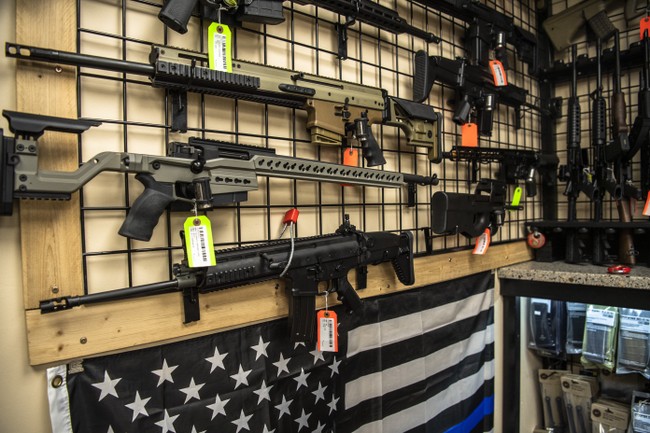We may earn revenue from the products available on this page and participate in affiliate programs. Learn More ›
There has been a long line of capable tactical shotguns stretching back well over 100 years — and we can now add the Beretta 1301 Tactical Mod 2 to this brotherhood. A partial list includes the Winchester Model 97 Trench gun, Remington 870, Winchester 1200/1300 Defenders, Mossberg 590, and the Benelli M4 — all of which have proven their worth whether carried in the hands of soldiers and marines, riding in patrol cars, or stashed in peoples’ homes. Based on our testing, the Beretta 1301 Tactical Mod 2 will be a happy fit in any of these environments.
The family of 1301 Tactical guns includes several different models, varying in stock styles and colors. The version I tested has a pistol grip and folding stock from Chisel Machining. It is the most expensive, but unarguably the coolest of the 1301s.
See It
- Gauge: 12
- Action: Semi-auto, gas
- Capacity: 7+1
- Chamber: 3 inches
- Weight: 6.80 pounds (measured)
- Trigger Weight: 2.88 pounds (measured)
- Barrel Length: 18 inches
- Overall Length: 38 inches (depending on LOP), 29 inches folded
- LOP: 12.5 to 14.25 inches
- Sight: Ghost ring, rail included
- Barrel Finish: FDE
- Stock: Folding, detachable
- Price: $2,279
- Includes: CL, OCHP flush choke
Key Features
- B-Link gas operating system
- Folding butt stock that adjusts for LOP and comb height
- Ambidextrous cross-bolt safety and cheek piece
- Flexible red dot mounting options
- M-Lok slots on fore-end and barrel clamp
Review Highlights
- Cycles extremely fast
- Easy to control
- Excellent ergonomics
- Reliable

Patterning and Accuracy
The Beretta 1301 Tactical is one of the most accurate tactical shotguns we’ve tested. Ten shot groups with slugs at 25 yards averaged 1.939 inches, using three different loads. With Hornady American Gunner slugs, it printed a 1.504-inch group.
It also patterned buckshot very well. With Hornady’s Critical Defense 00 buckshot, all pellets landed within the A Zone of an IPSC target at both 7 yards and 15 yards. At 25 yards, all but two pellets hit within the A Zone and C Zone (those two pellets ended up in the D Zone).
This data was gathered during our annual shotgun test and was also incorporated into my roundup of the best tactical shotguns. The only shotgun that was more accurate than the 1301 was the Mossberg 940 Pro Tactical Thunder Ranch, which averaged 1.902-inch 10-shot groups with slugs at 25, slightly besting the Beretta. The average group size for the rest of the field was 3.704 inches.

Photo by Natalie Krebs
The Action
The heart of the 1301 is Beretta’s B-Link (pronounced “blink”) gas operating action, which is known for its speed and reliability. It uses a gas-actuated piston positioned about halfway up the barrel that drives the bolt group backwards to cycle the gun. It includes a chromed rotating bolt head that is slick and resists fouling, enabling the gun to digest hundreds of rounds without needing to be cleaned. The bolt’s slick construction is also part of the reason the gun cycles as quickly as it does.
The design of the valve in the piston also contributes to the shotgun’s reliability. It creates an efficient seal that cuts down on the amount of fouling that gets back into the action.
The B-Link system’s reputation for reliability was borne out during our testing. The sample I’ve been shooting (and abusing) for a few months has held up admirably well.
My colleagues and I have put well over a thousand rounds through the gun, and haven’t had any failures to feed or cycle — with a couple exceptions. One is that when loading the shotgun with seven shells, the last shell doesn’t insert all the way into the magazine and sometimes that causes the shell not to cycle. I addressed that by just loading the magazine with six shells.
There was also one time while shooting slugs (you can see the clip in the video review we’ve embedded here) where the gun dropped the shell on the ground rather than pick it up on the shell lifter. That was an isolated incident I haven’t been able to recreate.
From an operational standpoint, both situations were remedied by depressing the slide lock tab in front of the trigger guard, which released the next shell in the magazine, and racking the action.

Photo by Alex Robinson
Beretta 1301 Tactical Mod 2 Ergonomics
Reliability is a great benefit in any firearm, but particularly so with tactical shotgun. That said, it’s only part of the equation. Because of the intense nature of a tactical shotgun, if you cannot control the gun and operate it smoothly, you are at a huge disadvantage.
This is another area where the Beretta 1301 Tactical Mod 2 shined. The pistol grip and fore-end, which has deep aggressive texturing molded along its length, allows you to grasp and control the shotgun with assurance. The grip is rubberized around its lower two-thirds, and is smooth, hard polymer up top.
This hybrid configuration works well, creating a solid connection between the palm of the hand and where the fingers of the shooting hand wrap around, while the slick portion above allows for easy maneuvering of the trigger finger and keeps the web of the hand from getting beat up.
The gun’s other controls are well sized and positioned to be within easy reach and work in a smooth positive manner when manipulated by the shooter.

Photo by Natalie Krebs
The crossbolt safety, for instance, sits at the front of the trigger guard and rests right under the trigger finger when it is indexed along the gun prior to shooting. It has a nicely textured surface and clicks back and forth between safe and fire with no mush or grit. It can also be reversed for left-handed shooters.
The bolt release tab is slightly oversized and is easy to locate and operate as well. It doesn’t require excess effort to depress to drop the bolt, but it also isn’t so light that you’re worried about the bolt falling when you don’t want it to.
Beretta 1301 Tactical Mod 2 Trigger
The trigger on the 1301 Tactical has a semi-flat face, as Beretta describes it. It is nearly vertical (hence flat) but has a slight curve machined into it. I like the design a lot. With a pistol grip stock, a vertical trigger is usually the way to go. The slight curve on the trigger face does a good job supporting the pad of the trigger finger from top to bottom. It is more like something you’d find on a precision rifle rather than a tactical shotgun.
The trigger has a clean, crisp break and short reset. Coupled with the speed and reliability of the action, and the gun’s ergonomics, this high-quality trigger allows for extremely fast and accurate shooting.
Of the seven tactical shotguns we tested in the roundup, none could approach the speed with which we were able to accurately shoot the Beretta 1301.

Photo by Natalie Krebs
Running the Beretta 1301 Tactical Mod 2
In recent years, many tactical shotguns have taken a page from the world of 3-gun and multi-gun shooting where the ability to reload a shotgun in a flash is of paramount importance.
So we’ve seen receivers with larger loading ports, often with beveled edges, no-pinch shell lifters, and other ergonomic touches to facilitate easy loading.
The Beretta 1301 Tactical Mod 2 incorporates all these elements, and I was able to fill the magazine quickly with no hang-ups or glitches throughout my evaluation.
My sample came with the optional MatchSaverZ shell holder, which is a clamp positioned just in front of the ejection port that holds an extra shell. So when the gun runs dry and the bolt is locked open, all you have to do is strip the shell toward the rear and guide it into the receiver. With a little practice you can do this rapidly. It’s a great way to swap to a different type of munition or just get another shot downrange in a hurry.
Given how easy the 1301 is to shoot and reload it is no surprise we were able to burn through massive quantities of shells while taking on different target arrays.
Sight Options

Photo by Natalie Krebs
Being able to get a quantity of shots down range doesn’t do much good if you can’t control where they hit and, in this area, the Beretta 1301 Tactical Mod 2 excels as well.
The shotgun ships with robust and capable ghost ring sights. The front and rear are both protected by sturdy wings that will survive anything short of a nuclear strike. The rear sight also has clearly marked elevation and windage adjustments to tune the point of aim.
But as with most shotguns and handguns these days, the Beretta 1301 Tactical is equipped to take a red dot or other optic. There’s a 3-inch segment of Pictainny rail in front of the rear sight for this purpose, but the gun comes with another optic mounting option too.
Just behind the rear sight at the back of the receiver is a platform on the stock with a RMR footprint. I screwed a Trijicon RMR Type 2 to the mount and used that throughout the evaluation. The mounting plate positions the red dot lower to the bore axis than the Picatinny rail does and co-witnesses with the ghost ring sights should something happen to the red dot.
Chisel Machining Stock

Photo by Natalie Krebs
The folding stock from Chisel Machining is an elegant bit of kit. It has a lot of qualities that enhance the operation of the Beretta and, if for some reason you have a 1301 without this stock and feel like splurging, I highly recommend the upgrade.
The stock can be adjusted to accommodate whatever sighting system the shooter chooses. The cheekpiece can be flipped from one side to the next for lefties, it moves up and down to set the comb height, and the length of pull adjusts in 1/4-inch intervals from 12.5 inches to 14.25 inches.
For my physique and style of shooting I positioned the LOP at 13.5 inches and lowered the comb all the way down, which worked perfectly for me.
The overall length with the 1301’s 18-inch barrel is roughly 38 inches, depending on where you set the LOP. When folded, the shotgun measures 29 inches.
(As an aside, the barrel takes Beretta Optima Choke HP (OCHP) chokes. It comes with one flush-mounted Cylinder choke.)

The stock doesn’t have any external knobs or levers, and instead adjusts with Allen-head fasteners that are unobtrusive and won’t get snagged on clothing and other gear.
The stock also has attachment points for slings and a five-shot shell carrier that Chisel Machining also makes. (The barrel clamp at the front of the gun has QD cups on either side for attaching the other end of a sling.)
The folding mechanism is incredibly solid, and when the stock is locked open, it is stiff and secure. Folding the stock takes some effort as you have to overcome the stout spring that is used to keep the hinge locked. But once you master the squeezing motion it isn’t difficult to operate.
When the stock is folded, it sits flush against the left side of the receiver, so it doesn’t block the ejection port, charging handle, and bolt release. It is designed so you can run the gun in this collapsed position.
To unfold and deploy the stock all you need to do is give it a gentle tug and it will overcome the detents that keep it from flopping around.
The recoil pad on the stock is broad, squishy and very effective. It did a good job absorbing blows from the heavier rounds we put through the gun. Even though the shotgun is light, we were able to run it hard without beating our shoulders to hamburger.
Because of the shotgun’s excellent ergonomics and smooth action, it is a joy to shoot and shoot fast. And we couldn’t keep it loaded for any length of time before sending a spray of hulls across the range.

Photo by Natalie Krebs
M-Lok Slots
The 1301 also has attachment points for a light or laser on the fore-end. It has three M-Lok slots located at the 3, 6, and 9 o’clock positions for this purpose. In addition, the barrel clamp has an M-Lok slot on either side as well.
Fit and Finish
The shotguns come in a couple different color schemes, although I think that the FDE is the most attractive of the bunch. The barrel and metal work have been Cerakoted in FDE and the fore-end is molded from polymer of that color. The folding stock is anodized black, and from an aesthetic standpoint it goes nicely with the rest of the gun.
Overall, the 1301 is handsome and purposeful looking. Beretta did a nice job in this regard.
The innards of the shotgun are finished nicely too. The bolt head and inside of the receiver are polished chrome and seem to resist fouling and corrosion well.

Photo by Natalie Krebs
Field Stripping the Beretta 1301 Tactical Mod 2
To break the gun down start by removing the barrel clamp in front of the fore-end. Once the two Allen head fasteners it employs are loosened it will slide off the barrel, allowing you to unscrew the cap on the magazine tube and pull the fore-end free.
Once the fore-end is off, the barrel and its attached gas piston can slide free as well.
To remove the bolt and bolt assembly you remove the charging handle. That’s done by depressing the bolt head slightly so that a cut in the bolt head lines up with the bolt handle allow you to pull it free — kind of like how the slide stop is removed from a 1911.
After the handle is removed, the bolt assembly, which includes the two action bars that serve as the connection between the gas piston and bolt body, can be freed from the gun.
To get to the innards of the bolt, remove the retaining pin at the rear of the bolt body. Just make sure you have a finger over the firing pin to prevent it and the firing pin spring from launching across the room once the retaining pin is withdrawn.
After the firing pin is out you can slide the breech bolt pin free, which will let you remove the bolt head from the bolt body.
At this point you have access to all the major components in the shotgun and can give it a thorough cleaning.
Beretta 1301 Tactical Mod 2 Pros and Cons
This is such a smartly designed gun with good workmanship that there isn’t much to find fault with.
Pros
- Fast shooting
- Good accuracy
- Easy to control
- Flexible sighting options
- Compact ergonomic profile
Cons
Final Thoughts on the Beretta 1301 Tactical Mod 2
The 1301 Tactical is an easy gun to gush about, because it hits all the high notes for a tactical shotgun. It accepts red dot optics with ease, has good fixed sights, a folding stock that adjusts every way you could desire, a pistol grip and fore-end that are easy to hang on to, and a reliable action that can run as fast as a belt-fed when you want to get after it. It is the kind of gun that makes you a better shooter.
As long as your budget can withstand the initial outlay to acquire the gun, and then support whatever habit you’re likely to develop in terms of making empty hulls out of target loads, you will not regret the purchase. But it is no mere toy. It is a serious tool, capable of doing everything one could ask of a tactical shotgun.
Among today’s best defensive shotguns, the Beretta 1301 Tactical Mod 2 has a solid claim as the most refined and elegantly designed of the lot. Currently, you won’t find a better tactical shotgun out there.
Read the full article here









![Newsom Plans Tarmac Ambush as Trump Surveys Wildfire Devastation [WATCH] Newsom Plans Tarmac Ambush as Trump Surveys Wildfire Devastation [WATCH]](https://www.rvmnews.com/wp-content/uploads/2025/01/2025.01.24-11.46-rvmnews-67937d7c5309e.jpg)
